Charles E W Bean, Diaries, AWM38 3DRL 606/254/1 - 1917 - 1933 - Part 9
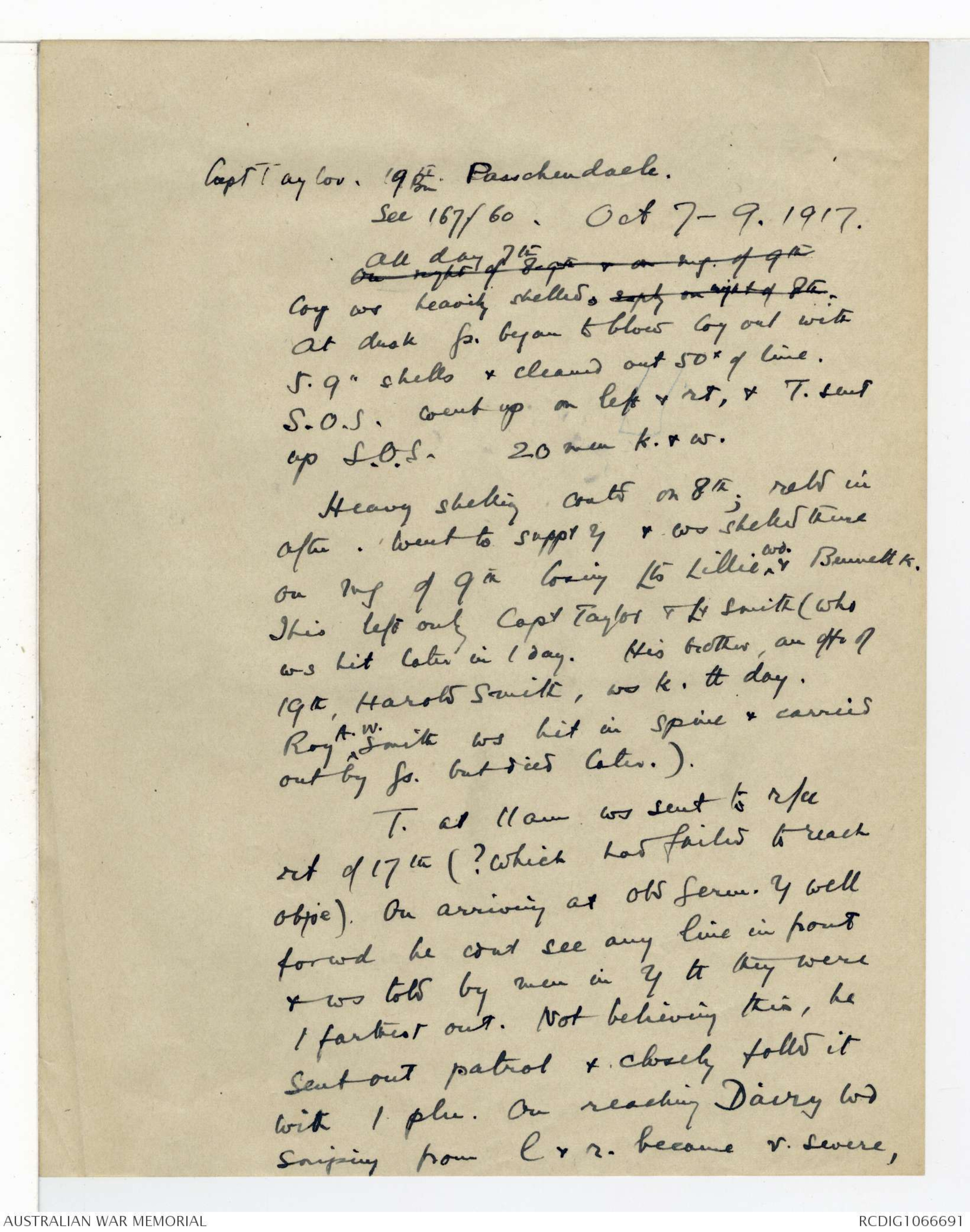
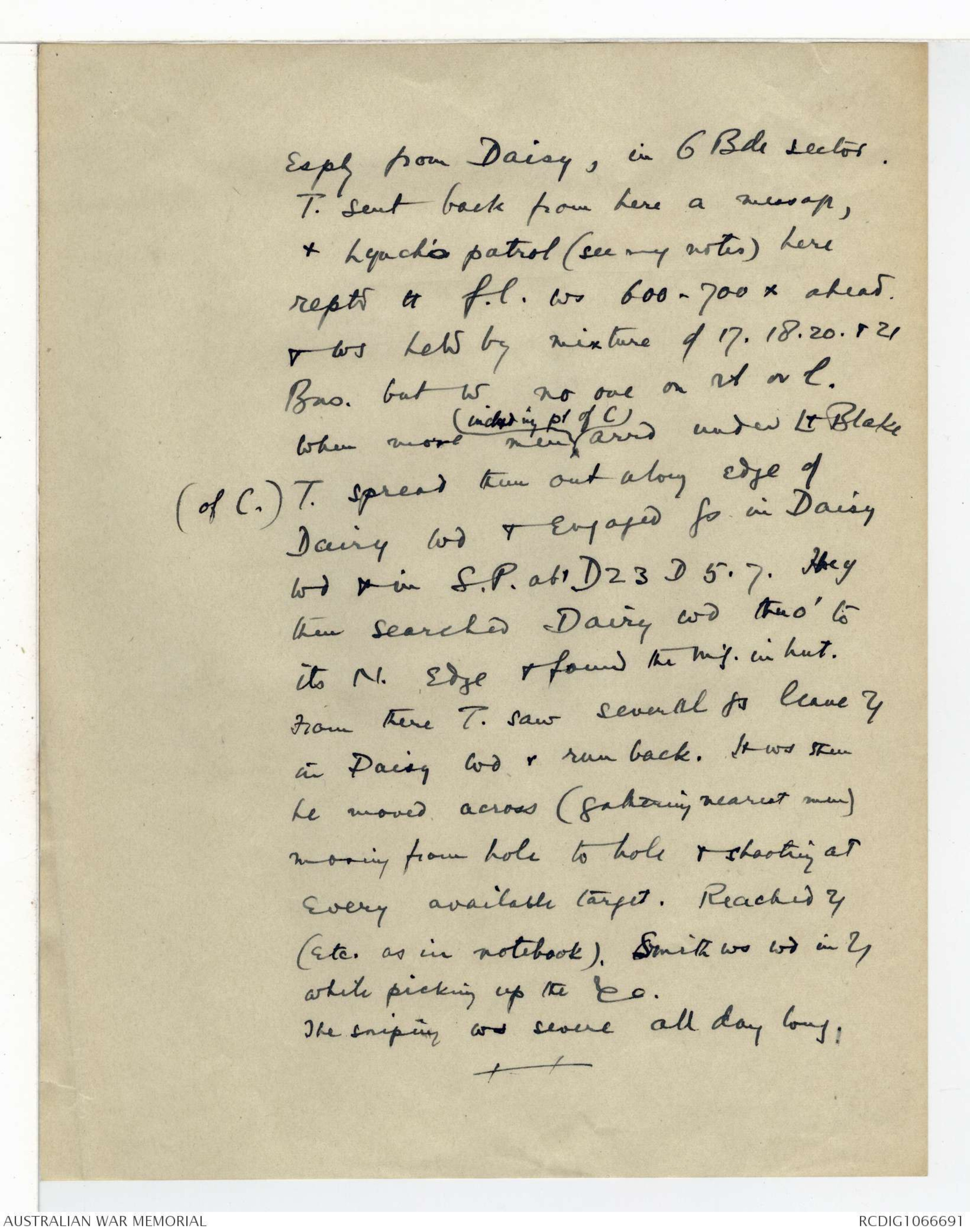
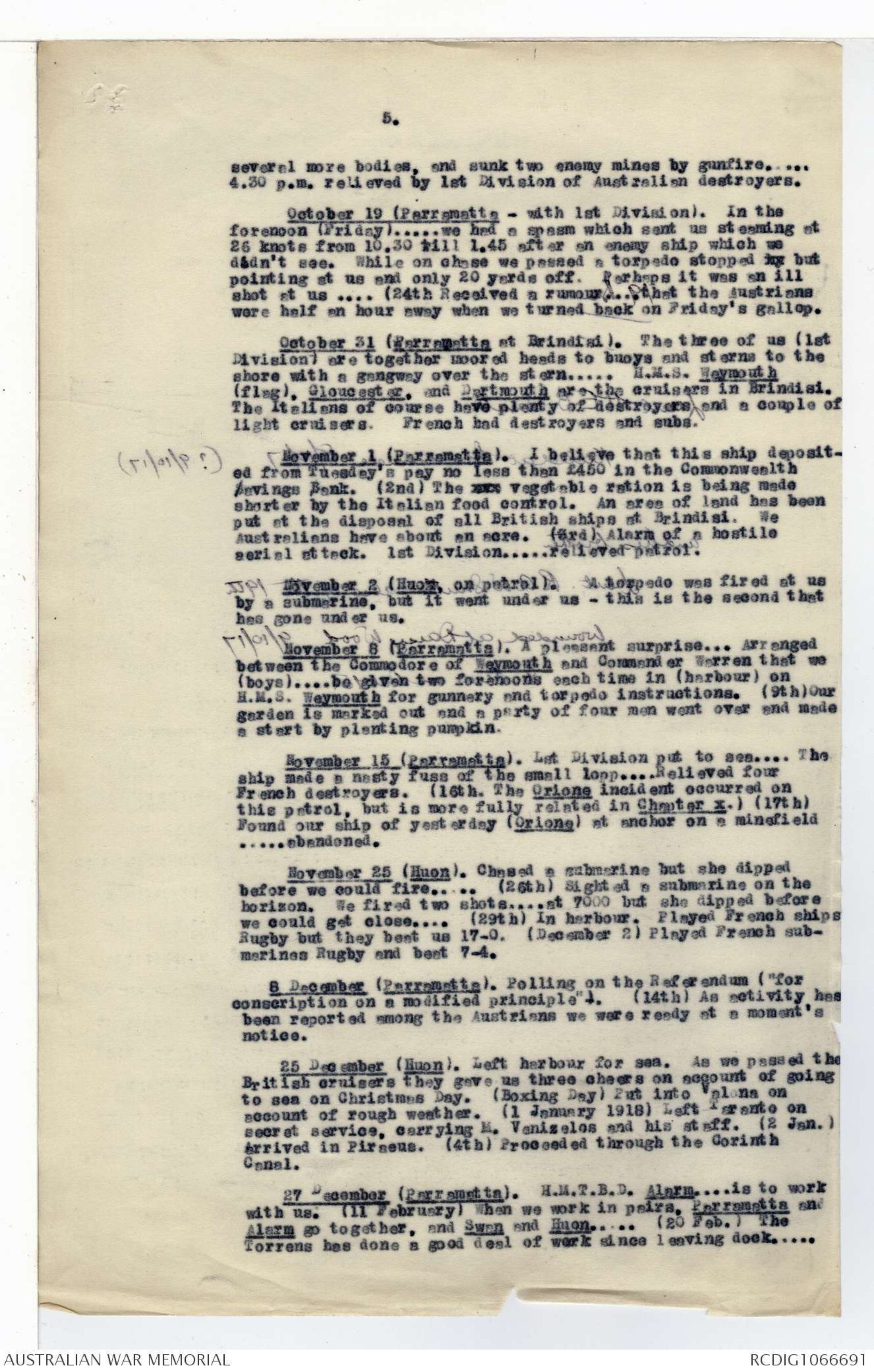
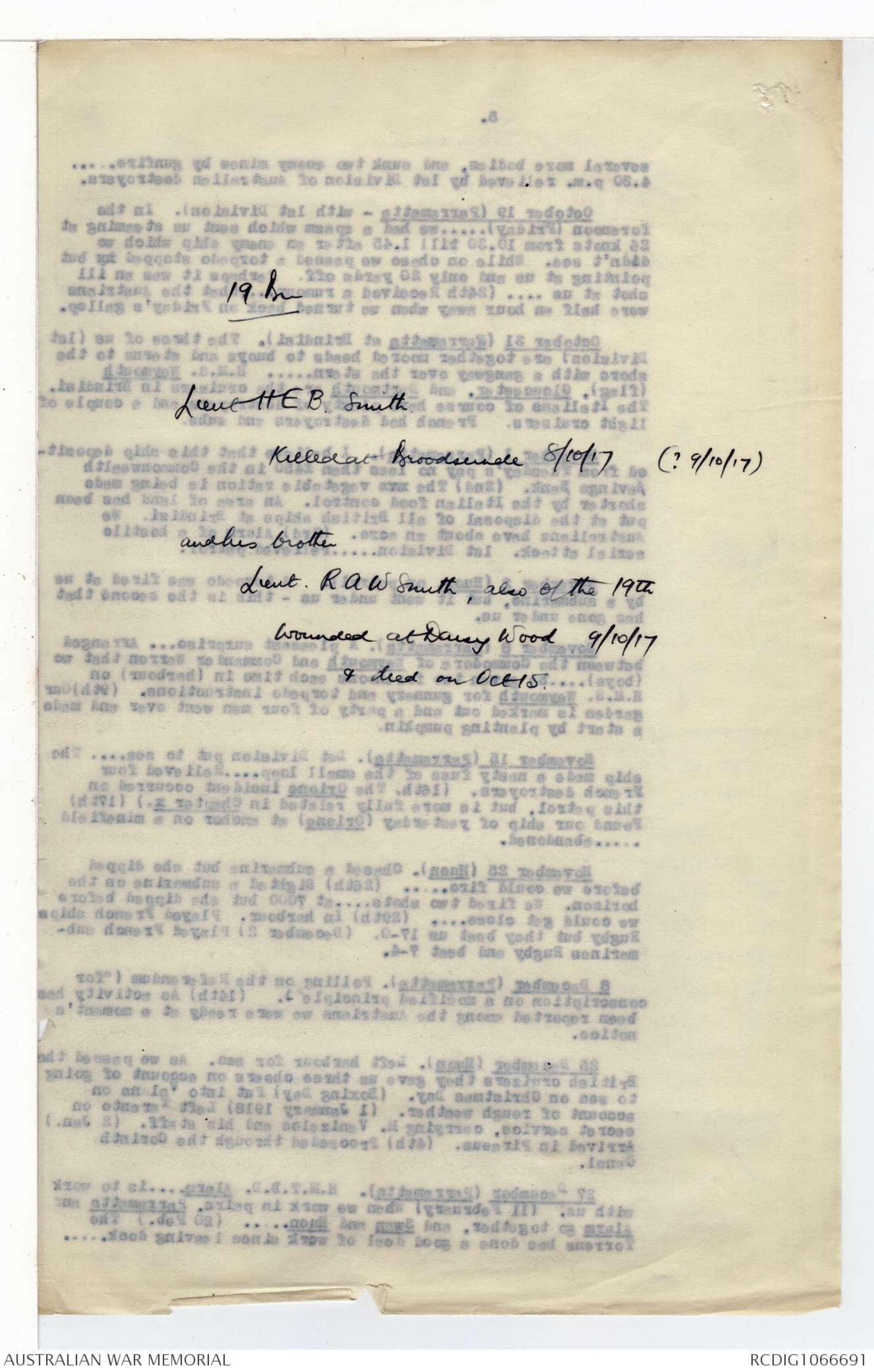
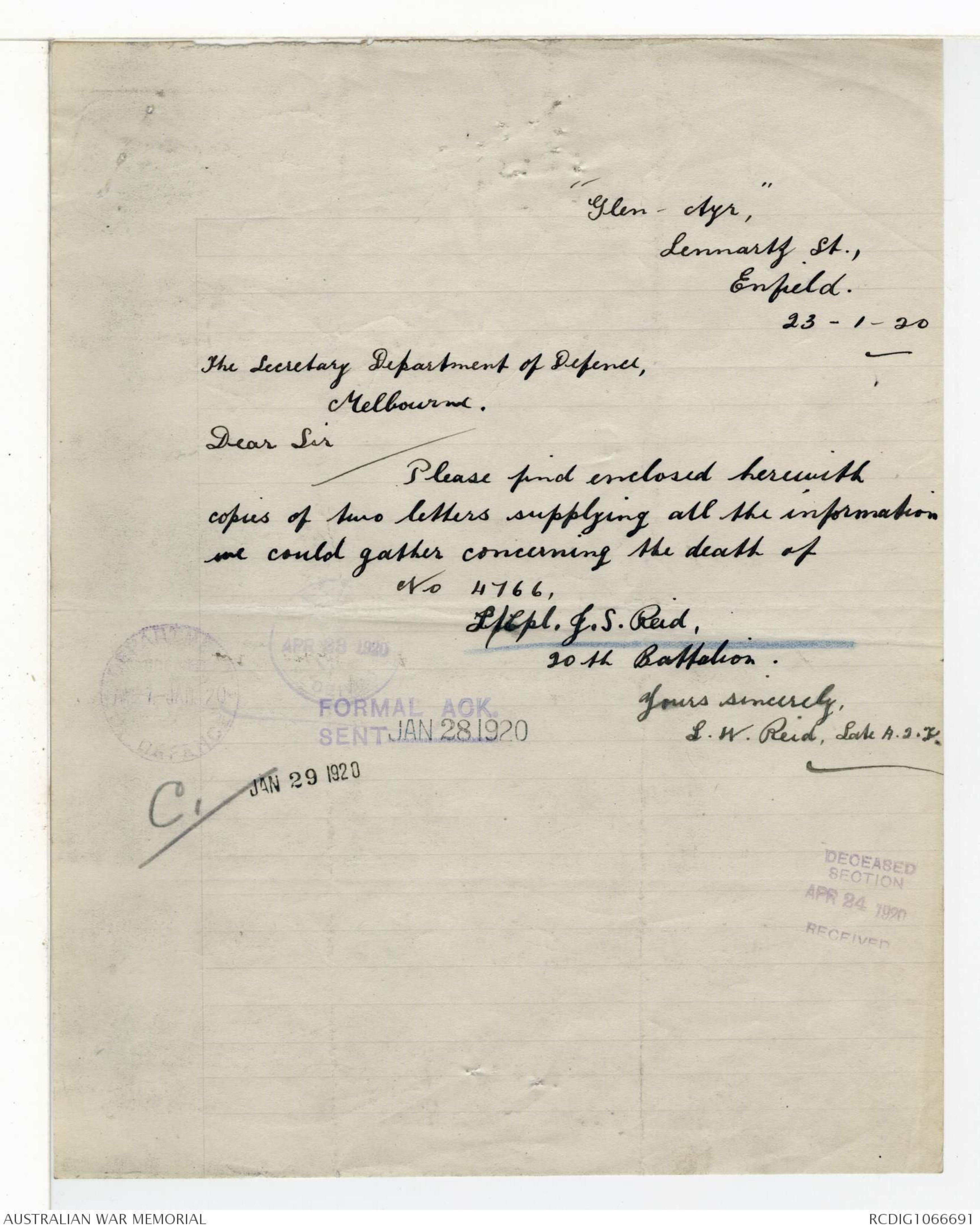
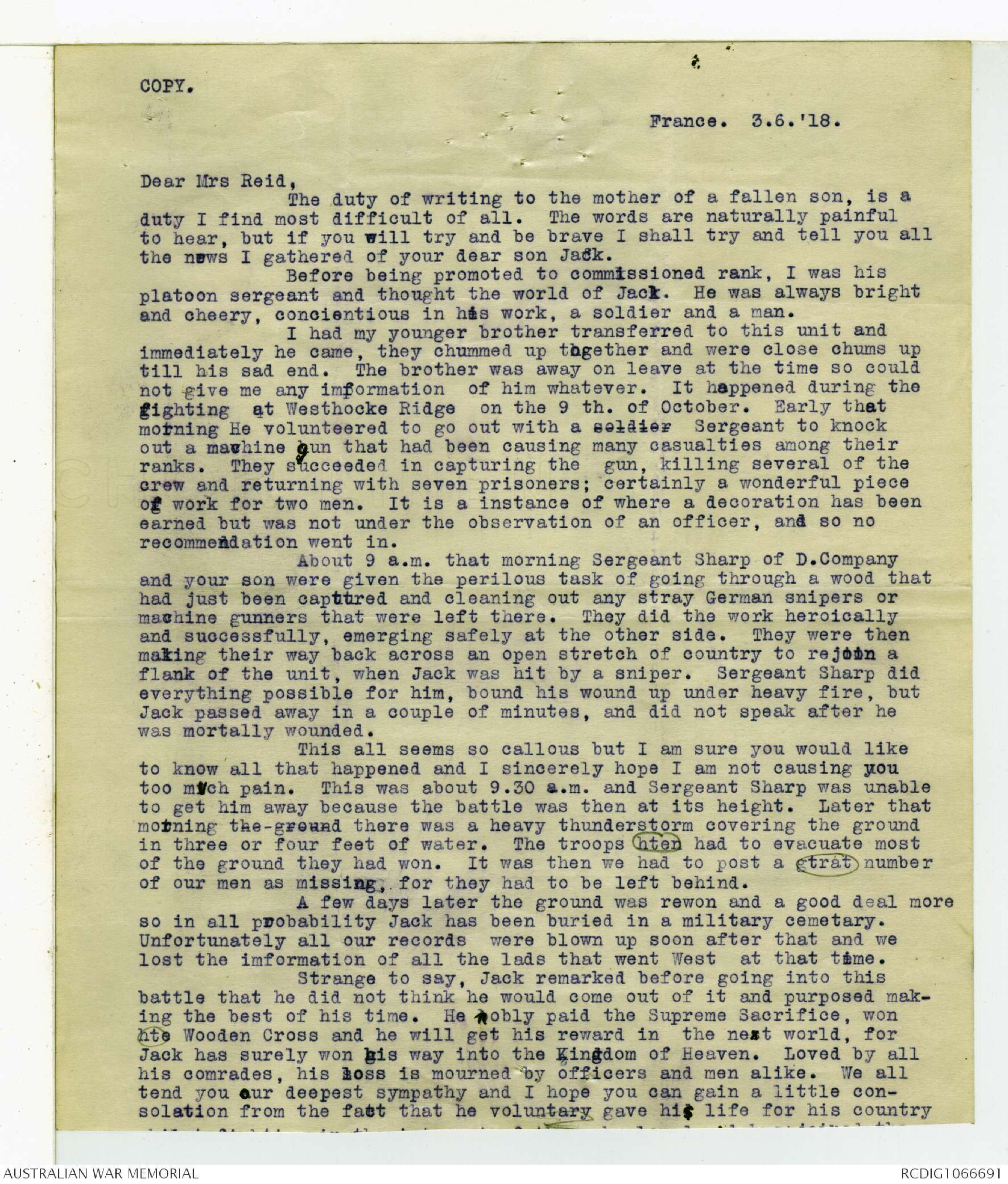
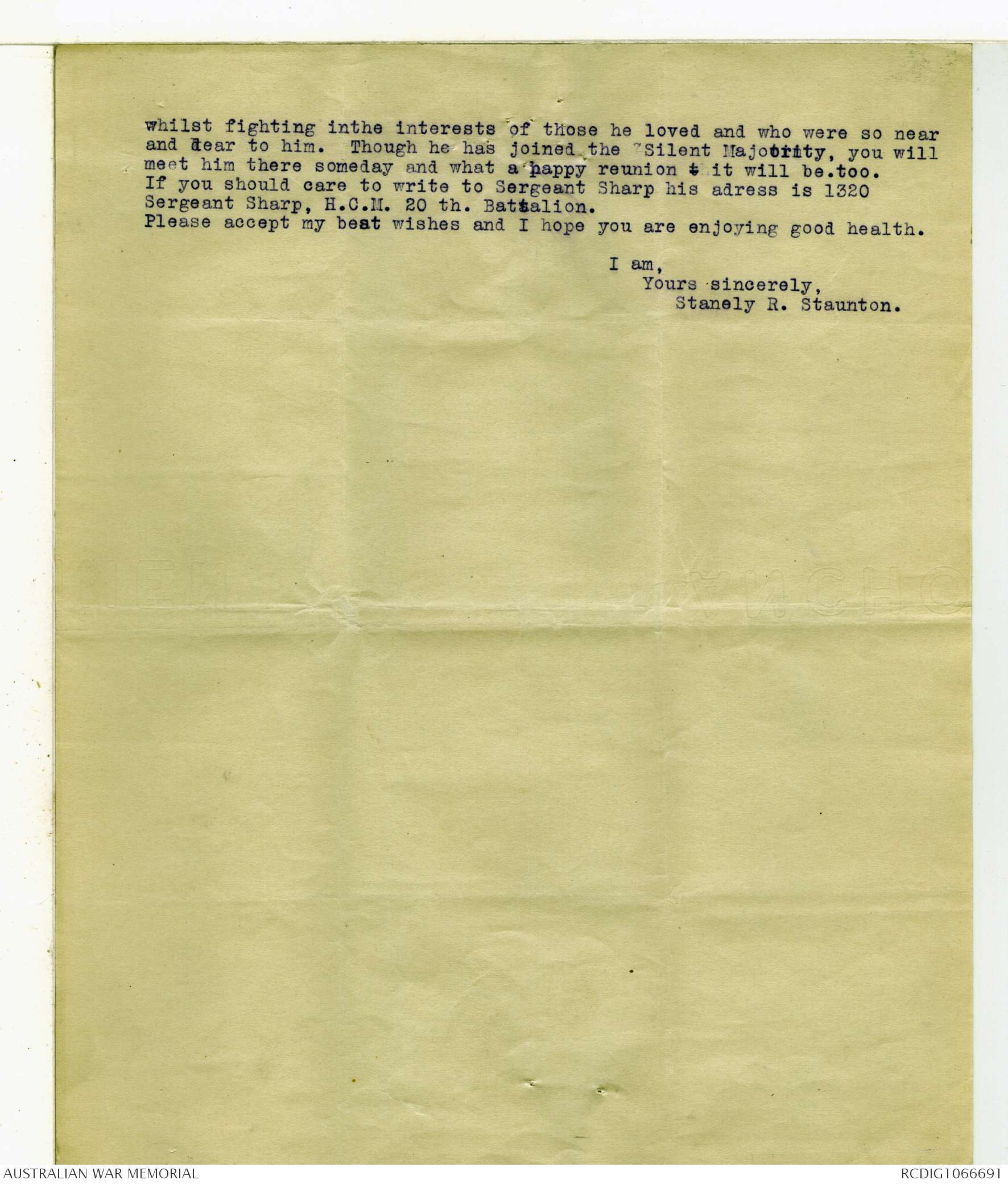
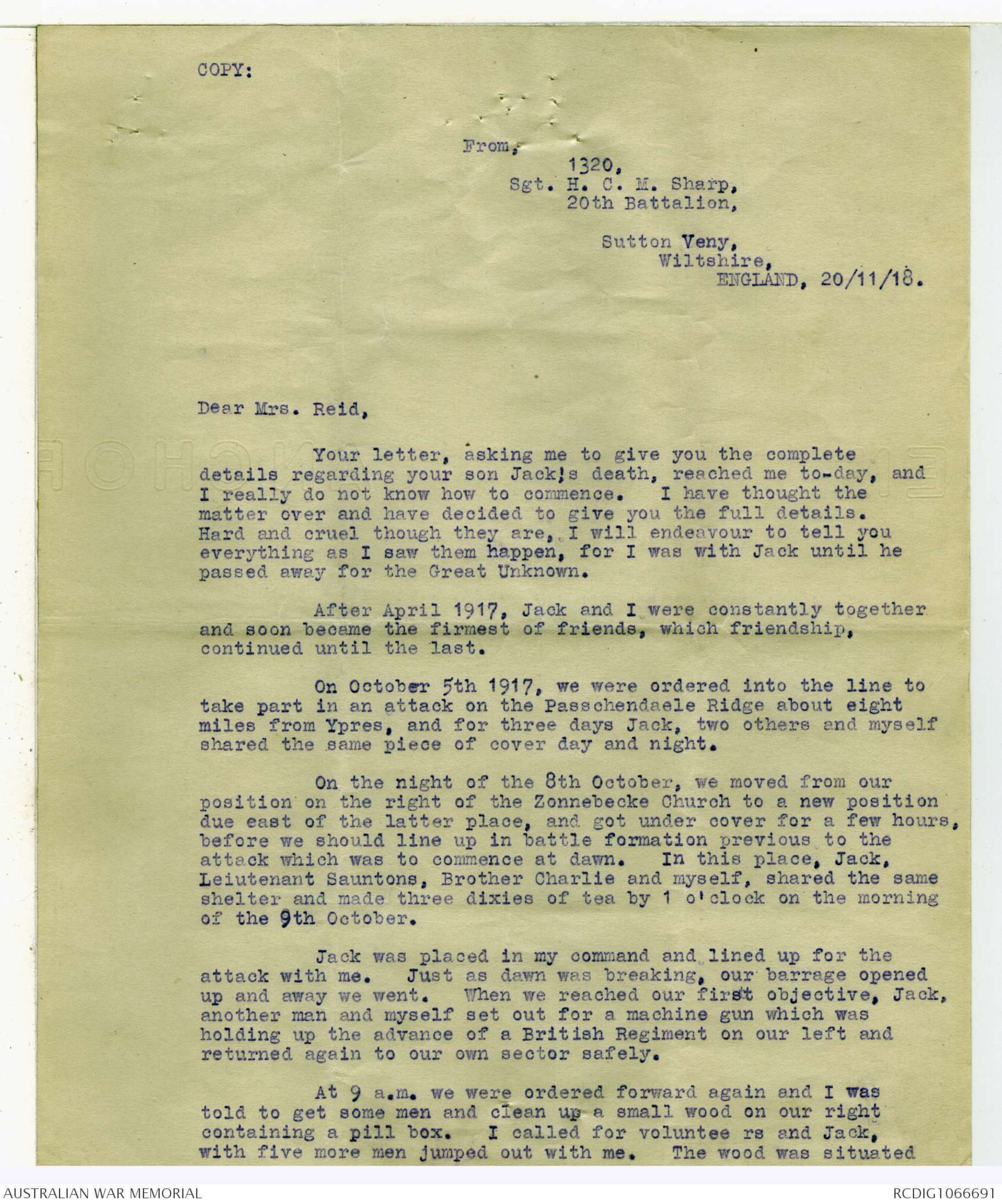
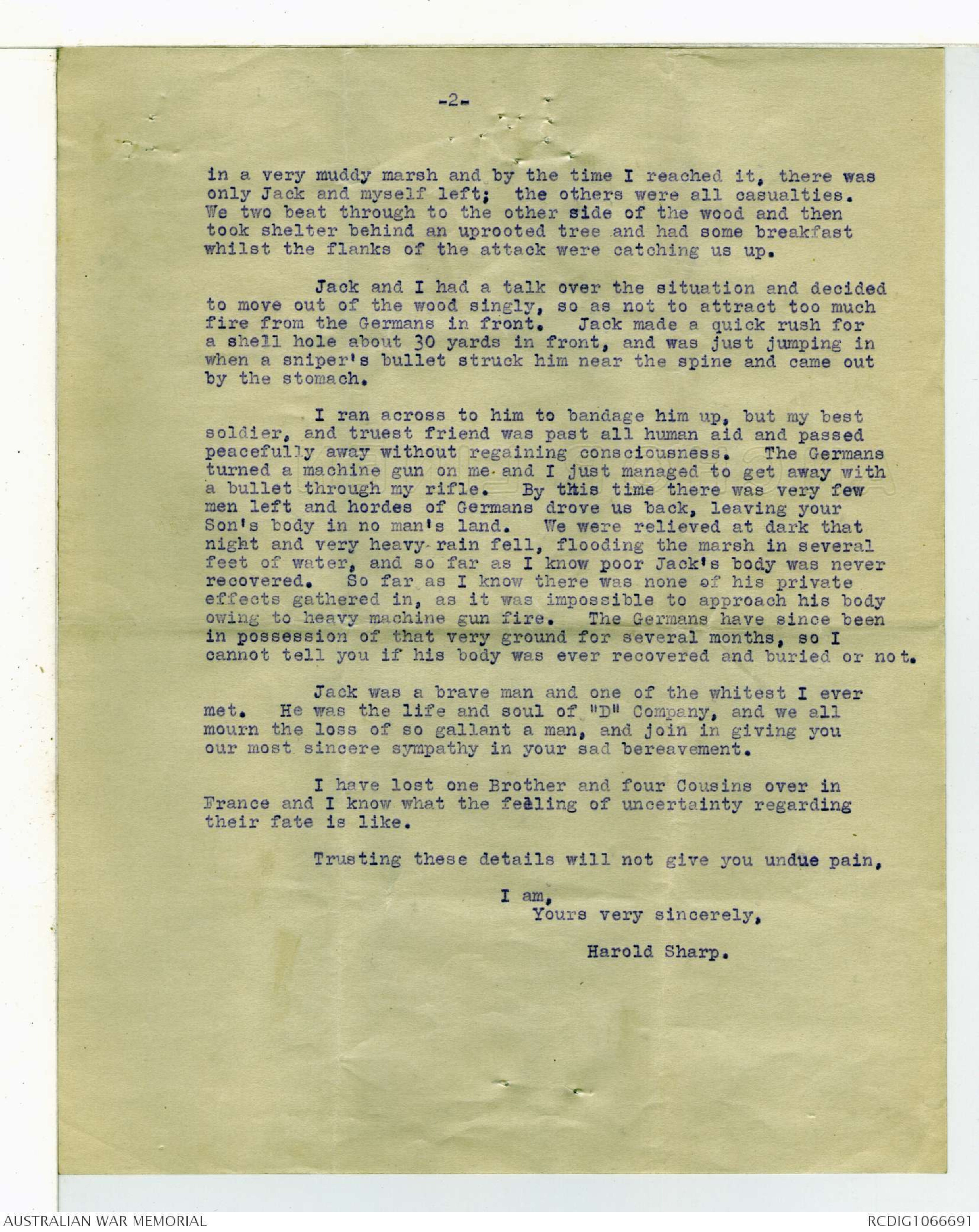
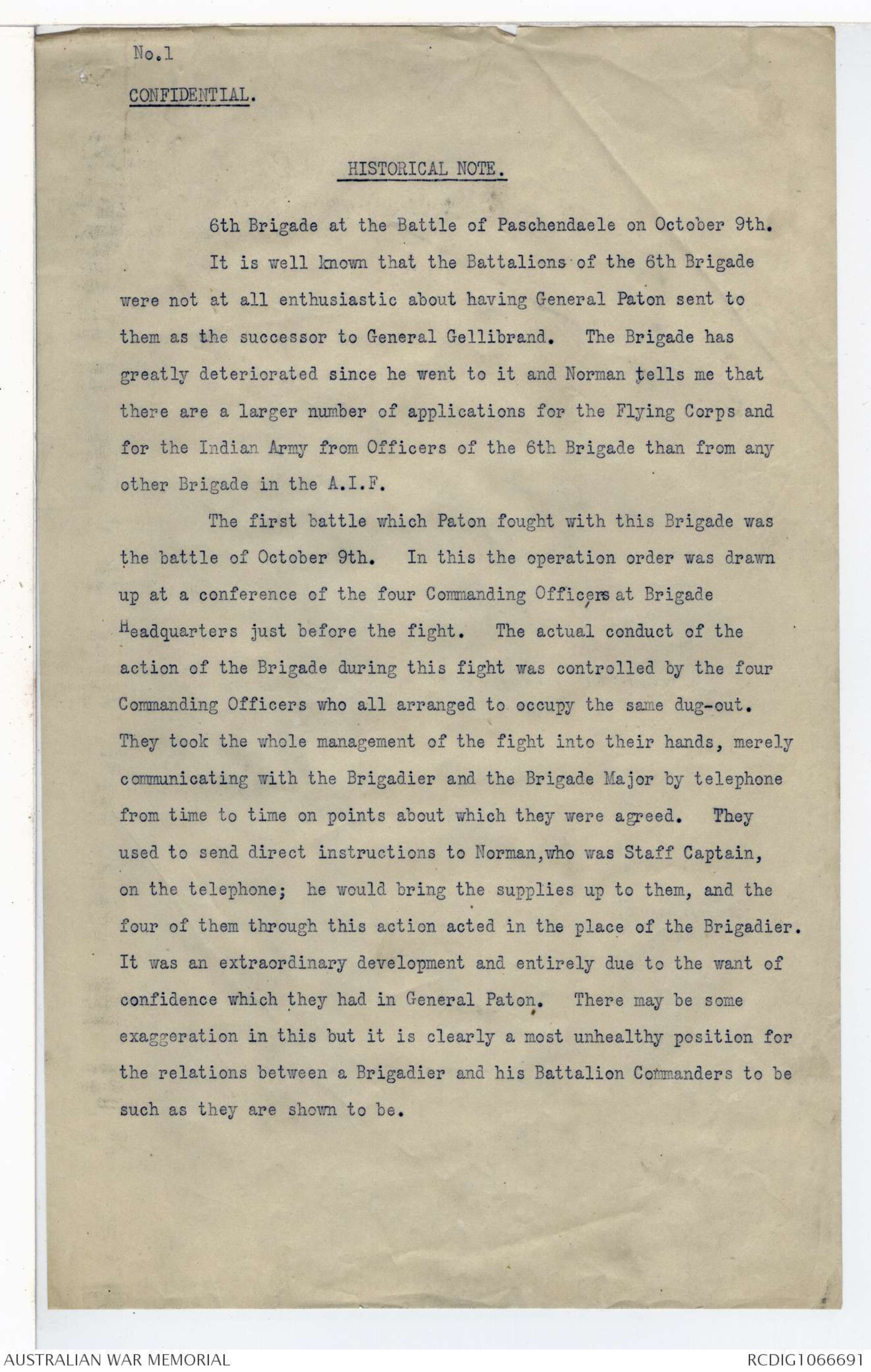
Capt Taylor. 19th Bn. Passchendaele.
See 167/60. Oct 7-9. 1917.
On right of 8-9th & on mg. of 9th All day 7th
Coy ws heavily shelled, esply on night of 9th.
At dusk Gs. began to blow Coy out with
5.9" shells & cleaned out 50x of line.
S.O.S. went up on left & rt, & T. sent
up S.O.S. 20 men k. & w.
Heavy shelling contd on 8th; reld in
aftn. Went to suppt trench & ws shelled there
on mg of 9th losing Lts Lillie ^wd. & Bennett k.
This left only Capt Taylor & Lt Smith (who
ws hit later in / day. His brother, an offr of
19th, Harold Smith, ws k. tt day.
Roy ^ A. W. Smith ws hit in spine & carried
out by Gs. but died later.).
T. at 11 am ws sent to rfce
rt of 17th (? which had failed to reach
objve). On arriving at old Germ. trench well
forwd he cdnt see any line in front
& ws told by men in trench tt they were
/ farthest out. Not believing this, he
sent out patrol & closely folld it
with / pln. On reaching Dairy Wd
sniping from l & r. became v. severe,
esply from Daisy, in 6 Bde sector.
T. sent back from here a message,
& Lynch's patrol (see my notes) here
reptd that f.l. ws 600-700 x ahead.
& ws held by mixture of 17. 18. 20. & 21
Bns. but w no one on rt or l.
When more men ^ including pt of C arrd under Lt Blake
(of C.) T. spread them out along edge of
Dairy wd & engaged Gs in Daisy
wd & in S.P. abt D23 D 5.7. They
then searched Dairy wd thro' to
its N. edge & found the m.g. in hut.
From there T. saw several Gs leave trench
in Daisy wd & run back. It ws then
he moved across (gathering nearest men)
moving from hole to hole & shooting at
every available target. Reached trench
(etc. as in notebook), Smith ws wd in trench
while picking up the prisoners.
The sniping ws severe all day long.
5.
several more bodies, and sunk two enemy mines by gunfire.....
4.30 p.m. relieved by 1st Division of Australian destroyers.
October 19 (Parramatta - with 1st Division). In the
forenoon (Friday) . . . . . we had a spasm which sent us steaming at
26 knots from 10.30 till 1.45 after an enemy ship which we
didn't see. While on chase we passed a torpedo stopped xx but
pointing at us and only 20 yards off. Perhaps it was an ill
shot at us . . . . (24th Received a rumour . . . . that the Austrians
were half on hour away when we turned back on Friday's gallop.
October 31 (Parramatta at Brindisi). The three of us (1st
Division) are together moored heads to buoys and sterns to the
shore with a gangway over the stern . . . . . H.M.S. Weymouth
(flag), Gloucester, and Dartmouth are the cruisers in Brindisi.
The Italians of course have plenty of destroyers and a couple of
light cruisers. French had destroyers and subs.
November 1 (Parramatta). I believe that this ship deposited
from Tuesday's pay no less than £450 in the CommonwealthSavings Bank. (2nd) The xxx vegetable ration is being made
shorter by the Italian food control. An area of land has been
put at the disposal of all British ships at Brindisi. We
Australians have about an acre. (3rd) Alarm of a hostile
aerial attack. 1st Division. . . . .relieved patrol.
November 2 (Huon, on patrol). A torpedo was fired at us
by a submarine, but it went under us - this is the second that
has gone under us.
November 8 (Parramatta). A pleasant surprise. . . Arranged
between the Commodore of Weymouth and Commander Warren that we
(boys). . . . be given two forenoons each time in (harbour) on
H.M.S. Weymouth for gunnery and torpedo instructions. (9th) Our
garden is marked out and a party of four men went over and made
a start by planting pumpkin.
November 15 (Parramatta). 1st Division put to sea. . . . The
ship made a nasty fuss of the small loop. . . . Relieved four
French destroyers. (16th. The Orione incident occurred on
this patrol, but in more fully related in Chapter X.) (17th)
Found our ship of yesterday (Orione) at anchor on a minefield
. . . . . abandoned.
November 25 (Huon). Chased a submarine but she dipped
before we could fire. . . . . (26th) Sighted a submarine on the
horizon. We fired two shots. . . .at 7000 but she dipped before
we could get close. . . . (29th) In harbour. Played French ships
Rugby but they beat us 17-0. (December 2) Played French submarines
Rugby and beat 7-4.
8 December (Parramatta). Polling on the Referendum ("for
conscription on a modified principle"). (14th) As activity has
been reported among the Austrians we were ready at a moment’s
notice.
25 December (Huon). Left harbour for sea. As we passed the
British cruisers they gave us three cheers on account of going
to sea on Christmas Day. (Boxing Day) Put into Valona on
account of rough weather. (1 January 1918) Left Taranto on
secret service, carrying M. Venizelos and his staff. (2 Jan.)
Arrived in Piraeus. (4th) Proceeded through the Corinth
Canal.
27 December (Parramatta). H.M.T.B.D. Alarm. . . . is to work
with us. (11 February) When we work in pairs Parramatta and
Alarm go together, and Swan and Huon. . . . . (20 Feb.) The
Torrens has done a good deal of work since leaving dock . . . . .
19 Bn
Lieut H E B. Smith
Killed at Broodseinde 8/10/17 (?9/10/17)
and his brother
Lieut. R A W Smith, also of the 19th
wounded at Daisy Wood 9/10/17
& died on Oct 15.
"Glen- Ayr,"
Lennartz St.,
Enfield.
23 -1-20
The Secretary Department of Defence,
Melbourne.
Dear Sir
Please find enclosed herewith
copies of two letters supplying all the information
we could gather concerning the death of
No 4766,
L/Cpl. J. S. Reid,
20th Battalion.
Yours sincerely.
L. W. Reid, Late A.I.F.
[*DEPARTMENT
27-JAN 20
OF DEFENCE*]
[*7-JAN 20
APR 28 1920
DEFENCE*]
[*FORMAL ACK.
SENT JAN 28 1920*]
[*C. JAN 29 1920*]
[*DECEASED
SECTION
APR 24 1920
RECEIVED*]
COPY.
France. 3.6. '18.
Dear Mrs Reid,
The duty of writing to the mother of a fallen son, is a
duty I find most difficult of all. The words are naturally painful
to hear, but if you will try and be brave I shall try and tell you all
the news I gathered of your dear son Jack.
Before being promoted to commissioned rank, I was his
platoon sergeant and thought the world of Jack. He was always bright
and cheery, conscientious in his work, a soldier and a man.
I had my younger brother transferred to this unit and
immediately he came, they chummed up thogether and were close chums up
till his sad end. The brother was away on leave at the time so could
not give me any imformation of him whatever. It happened during thegfighting at Westhocke Ridge on the 9 th. of October. Early that
morning He volunteered to go out with a soldier Sergeant to knock
out a mavchine lgun that had been causing many casualties among their
ranks. They succeeded in capturing the gun, killing several of the
crew and returning with seven prisoners; certainly a wonderful piece
ogf work for two men. It is a instance of where a decoration has been
earned but was not under the observation of an officer, and so no
recommendation went in.
About 9 a.m. that morning Sergeant Sharp of D.Company
and your son were given the perilous task of going through a wood that
had just been capttured and cleaning out any stray German snipers or
machine gunners that were left there. They did the work heroically
and successfully, emerging safely at the other side. They were then
making their way back across an open stretch of country to rejoin a
flank of the unit, when Jack was hit by a sniper. Sergeant Sharp did
everything possible for him, bound his wound up under heavy fire, but
Jack passed away in a couple of minutes, and did not speak after he
was mortally wounded.
This all seems so callous but I am sure you would like
to know all that happened and I sincerely hope I am not causing you
too much pain. This was about 9.30 a.m. and Sergeant Sharp was unable
to get him away because the battle was then at its height. Later that
morning the-ground there was a heavy thunderstorm covering the ground
in three or four feet of water. The troops hten had to evacuate most
of the ground they had won. It was then we had to post a gtrat number
of our men as missing, for they had to be left behind.
A few days later the ground was rewon and a good deal more
so in all probability Jack has been buried in a military cemetary.
Unfortunately all our records were blown up soon after that and we
lost the information of all the lads that went West at that time.
Strange to say, Jack remarked before going into this
battle that he did not think he would come out of it and purposed making
the best of his time. He rnobly paid the Supreme Sacrifice, won
hte Wooden Cross and he will get his reward in the next world, for
Jack has surely won ghis way into the Kingdom of Heaven. Loved by all
his comrades, his loss is mourned by officers and men alike. We all
tend you our deepest sympathy and I hope you can gain a little consolation
from the fact that he voluntary gave his life for his country
whilst fighting inthe interests of those he loved and who were so near
and dear to him. Though he has joined the Silent Majoority, you will
meet him there someday and what a happy reunion t it will be.too.
If you should care to write to Sergeant Sharp his adress is 1320
Sergeant Sharp, H.C.M. 20 th. Battalion.
Please accept my best wishes and I hope you are enjoying good health.
I am,
Yours sincerely,
Stanely R. Staunton.
COPY:
From,
1320,
Sgt. H. C. M. Sharp,
20th Battalion,
Sutton Veny,
Wiltshire,
ENGLAND, 20/11/18.
Dear Mrs. Reid,
Your letter, asking me to give you the complete
details regarding your son Jack’s death, reached me to-day, and
I really do not know how to commence. I have thought the
matter over and have decided to give you the full details.
Hard and cruel though they are, I will endeavour to tell you
everything as I saw them happen, for I was with Jack until he
passed away for the Great Unknown.
After April 1917, Jack and I were constantly together
and soon became the firmest of friends, which friendship,
continued until the last.
On October 5th 1917, we were ordered into the line to
take part in an attack on the Passchendaele Ridge about eight
miles from Ypres, and for three days Jack, two others and myself
shared the same piece of cover day and night.
On the night of the 8th October, we moved from our
position on the right of the Zonnebecke Church to a new position
due east of the latter place, and got under cover for a few hours,
before we should line up in battle formation previous to the
attack which was to commence at dawn. In this place, Jack,
Leiutenant Sauntons, Brother Charlie and myself, shared the same
shelter and made three dixies of tea by 1 o’clock on the morning
of the 9th October.
Jack was placed in my command and lined up for the
attack with me. Just as dawn was breaking, our barrage opened
up and away we went. When we reached our first objective, Jack,
another man and myself set out for a machine gun which was
holding up the advance of a British Regiment on our left and
returned again to our own sector safely.
At 9 a.m. we were ordered forward again and I was
told to get some men and clean up a small wood on our right
containing a pill box. I called for voluntee rs and Jack,
with five more men jumped out with me. The wood was situated
-2-
in a very muddy marsh and by the time I reached it, there was
only Jack and myself left; the others were all casualties.
We two beat through to the other side of the wood and then
took shelter behind an uprooted tree and had some breakfast
whilst the flanks of the attack were catching us up.
Jack and I had a talk over the situation and decided
to move out of the wood singly, so as not to attract too much
fire from the Germans in front. Jack made a quick rush for
a shell hole about 30 yards in front, and was just jumping in
when a sniper’s bullet struck him near the spine and came out
by the stomach.
I ran across to him to bandage him up, but my best
soldier, and truest friend was past all human aid and passed
peacefully away without regaining consciousness. The Germans
turned a machine gun on me and I just managed to get away with
a bullet through my rifle. By this time there was very few
men left and hordes of Germans drove us back, leaving your
Son's body in no man's land. We were relieved at dark that
night and very heavy rain fell, flooding the marsh in several
feet of water, and so far as I know poor Jack's body was never
recovered. So far as I know there was none of his private
effects gathered in, as it was impossible to approach his body
owing to heavy machine gun fire. The Germans have since been
in possession of that very ground for several months, so I
cannot tell you if his body was ever recovered and buried or not.
Jack was a brave man and one of the whitest I ever
met. He was the life and soul of "D" Company, and we all
mourn the loss of so gallant a man, and join in giving you
our most sincere sympathy in your sad bereavement.
I have lost one Brother and four Cousins over in
France and I know what the feaeling of uncertainty regarding
their fate is like.
Trusting these details will not give you undue pain,
I am,
Yours very sincerely,
Harold Sharp.
No. 1
CONFIDENTIAL.
HISTORICAL NOTE.
6th Brigade at the Battle of Paschendaele on October 9th.
It is well known that the Battalions of the 6th Brigade
were not at all enthusiastic about having General Paton sent to
them as the successor to General Gellibrand. The Brigade has
greatly deteriorated since he went to it and Norman tells me that
there are a larger number of applications for the Flying Corps and
for the Indian Army from Officers of the 6th Brigade than from any
other Brigade in the A.I.F.
The first battle which Paton fought with this Brigade was
the battle of October 9th. In this the operation order was drawn
up at a conference of the four Commanding Officers at Brigade
Headquarters just before the fight. The actual conduct of the
action of the Brigade during this fight was controlled by the four
Commanding Officers who all arranged to occupy the same dug-out.
They took the whole management of the fight into their hands, merely
communicating with the Brigadier and the Brigade Major by telephone
from time to time on points about which they were agreed. They
used to send direct instructions to Norman, who was Staff Captain,
on the telephone; he would bring the supplies up to them, and the
four of them through this action acted in the place of the Brigadier.
It was an extraordinary development and entirely due to the want of
confidence which they had in General Paton. There may be some
exaggeration in this but it is clearly a most unhealthy position for
the relations between a Brigadier and his Battalion Commanders to be
such as they are shown to be.
 Deb Parkinson
Deb ParkinsonThis transcription item is now locked to you for editing. To release the lock either Save your changes or Cancel.
This lock will be automatically released after 60 minutes of inactivity.